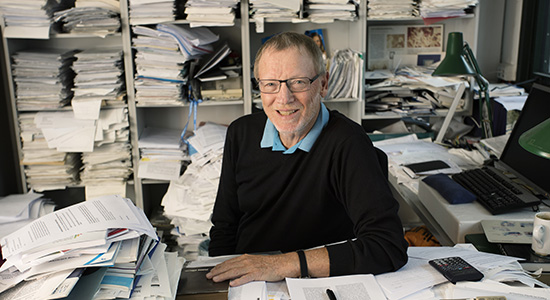Holst Group - Translational Metabolic Physiology
In our group, we combine laboratory experiments with clinical studies in order to understand the functional challenges of obesity and diabetes, and to provide new principles for improved therapy of these conditions.

We study endocrine regulation of metabolism, in particular the hormones of the pancreas and the gut, as well as transmitters and other factors of importance. We study the biology and physiology of each of the relevant hormones, and are particularly interested in measuring the hormones and transmitters using a variety of methods, mainly antibody based, but also employing mass spectrometry. In our laboratory we perform experimental studies reaching from single cell approaches, over isolated organs and islets to in vivo studies in suitable animals (pigs, rats and (transgenic) mice) but above all we are interested in human studies. A main experimental tool in our lab is studies of isolated perfused organs from mice and rats, the models include , the pancreas, the upper and lower small intestine, the colon and the liver. We also study visceral fat and isolated bones.
- In vivo studies (pigs, rats, transgenic mice, humans), isolated perfused organs
- Immunological approaches, such as enzyme-linked immunosorbent assay (ELISA), radioimmunoassays (RIA), immunohistochemistry (IHC)
In our group, laboratory experiments can be translated into effective clinical studies in order to understand the functional challenges of obesity and diabetes, and to provide new principles for improved therapy of these conditions.
The group focuses on the following research areas:
The role of pancreatic and intestinal hormones in bone physiology
Focuses on pancreatic and intestinal hormones and their role in intestinal and bone physiology. This includes both animal (mice, rat and pig) studies as well as human studies (gastric bypass patients, diabetic patients and healthy controls). In addition, we are continuously working on assay development to improve our unique spectrum of assays for measuring gastrointestinal hormones.
For further information regarding the role of pancreatic and intestinal hormones in bone physiology, please contact Bolette Hartmann.
Metabolism and physiology of enteroendocrine hormones
Focusses on the degradation and metabolism of the entero-pancreatic hormones (GLP-1, GLP-2, GIP, PYY, glucagon), the physiology and pathophysiology of the incretin hormones, and the therapeutic applications of the incretin hormones, GLP-1 analogues and DPP-4 inhibitors in the treatment of type 2 diabetes.
For further information regarding metabolism and physiology of enteroendocrine hormones, please contact Jens Juul Holst
Intergration of the gut in human glucose metabolism and its role in diabetes and obesity
Centers on the pathophysiology of type 2 diabetes (with focus on glucagon and the gut-derived incretin hormones), obesity, regulation of appetite and food intake and utilization of incretins as therapeutics. Integration of the gut (including enteroendocrinology, microflora and bile acid biology) in the understanding of human glucose metabolism and its role in type 2 diabetic pathophysiology is our main focus.
Major research goals are centered around the hormones Glucagon-Like Peptide-1 (GLP-1), which was discovered in our laboratory and has been studied extensively by the Section (analogues are now available for diabetes therapy, and are currently being evaluated for obesity treatment); Glucagon-like peptide-2, a regulator of intestinal growth and function as well as bone metabolism (also discovered in our lab, and recently approved for treatment of short-bowel syndrome); Glucose dependent Insulinotropic polypeptide (GIP), a regulator of insulin secretion and fat deposition; PYY (a powerful inhibitor of food intake); neurotensin (another appetite suppressant); and glucagon.
Other major goals are elucidation of the beneficial effects of gastric bypass surgery on both diabetes and obesity, and understanding the mechanisms at the organ, cellular and molecular level that cause exaggerated secretion of the gut hormones after bypass surgery with a view to reproduce this in future therapeutic strategies.
Domestic collaborations (including, but not limited to)
Hvidovre Hospital (Prof. Sten Madsbad) and the Diabetes Research Center at Gentofte Hospital (Prof. Tina Vilsbøll and Assoc. Prof. Filip Knop). NNF Center for Basic Metabolic Research: Metabolic Genetics (Prof.Torben Hansen); Metabolic Receptology (Prof. Mette Rosenkilde); Integrative Physiology (Juleen Zierath; Romain Barres); Liver Metabolism (profs Gerald Schulman, Kitt Falk Petersen). Other at the Faculty of Health and Medical Sciences : Professor Flemming Dela; Assoc prof Charlotte Mehlin-Sørensen; Prof. Gerrit van Hall; at Faculty for Natural Sciences: Prof. Erik Richter/Prof. Bente Kiens; Prof. Bo Feldt Rasmussen; Prof. Jens Rehfeld/Assoc. Prof. Linda Hilsted, Prof. Bente Klarlund; Prof. Palle Bekker Jeppesen; Prof. Bo Feld Rasmussen; Prof. Steen Haugaard. Hvidovre: Prof Sten Madsbad, Ovl Carsten Dirksen. Steno: Kirsten Nørgaard. Jørgen Rungby
International collaborations (including, but not limited to)
Germany: Professor Michael Nauck and Professor Juris Meier, both at the Ruhr-Universität, Bochum; ; USA: (Chris Newgard, Duke Univ; Denise Ney, Wisconsin; Doug Burrin/Houston; Adrian Vella Mayo Clinic. Canada:Dan Drucker, Toronto ; Japan (prof Yutaka Seino, Osaka), Australia (Michael Horowitz) Holland: (Jaqueline Dekker, Amsterdam; Max Nieuwdorph, Amsterdam; Ellen Blaak, Maastricht; Italy: (Ele Ferrannini; Andrea Giaccari; Theresa Mezza, Andrea Mari); Finland (Matikainen, MR Taskinen); France (Remy Burcelin, Toulouse);Switzerland (Christoph Beglinger) and Sweden: (Bo Ahrén, Lund; Lund; prof Peter Schmidt; Prof Erik Näslund; Åke Sjöholm, all Karolinska Institutet; Umeå: Julia Otten. England: An especially tight link has been established with the Fiona Gribble/ Frank Reimann group at the University of Cambridge.
Group Leader
Jens Juul Holst
Professor
jjholst@sund.ku.dk
Mobile:+45 2875 75 18
ORCID: 0000-0001-6853-3805
Group members
| Name | Title | Phone | |
|---|---|---|---|
| Daniel Bjørklund Andersen | Postdoc | +4535337499 | |
| Jens Juul Holst | Professor | ||
| Jon Vergara Ucin | PhD Fellow | ||
| Katrine Douglas Galsgaard | Postdoc | +4535337521 | |
| Samuel Addison Jack Trammell | Special Consultant | +4535335601 | |
| Tyler Alexander Cookson | Master Student |

